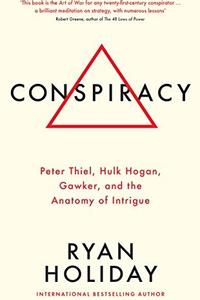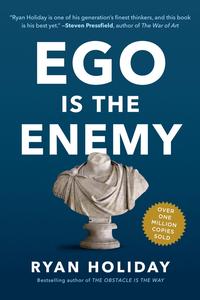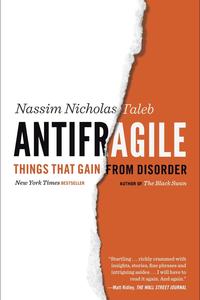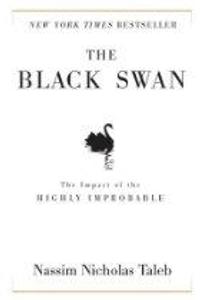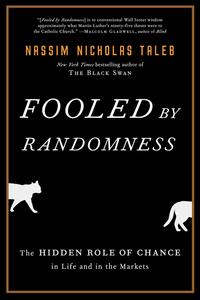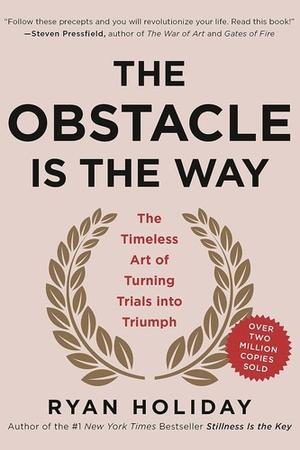
The Obstacle is the Way by Ryan Holiday: Summary & Notes
by Ryan Holiday
In One Sentence
The Stoic philosophy of turning obstacles into opportunities—using perception, action, and will to transform adversity into advantage.
Key Takeaways
- Perception: See obstacles objectively, without emotional distortion—find the opportunity within
- Action: Take persistent, creative action focused on what you can control
- Will: Build inner strength to endure what cannot be changed
- "The impediment to action advances action. What stands in the way becomes the way." —Marcus Aurelius
- Constraints breed creativity—limitations often force better solutions
- Amor fati (love of fate): embrace everything that happens as necessary for your growth
Summary
The best introduction to Stoic philosophy and how to apply it to modern life.
One of Holiday’s best books, this introduces concepts of Stoicism and how to apply them to real life. The principles can be applied to any and all obstacles we face in life, which is what makes Stoicism so powerful.
I don’t have much patience for philosophy, but some of the final lines sum up why I like this book so much: "The essence of philosophy is action—in making good on the ability to turn the obstacle upside down with our minds...
Now you are a philosopher and a person of action. And that is not a contradiction.”
Who Should Read This Book
- Anyone facing significant challenges or setbacks
- Leaders and entrepreneurs dealing with adversity
- People interested in Stoic philosophy applied to modern life
- Athletes, performers, and competitors seeking mental frameworks
FAQ
What is the main philosophy of The Obstacle is the Way?
The book adapts Stoic philosophy, particularly Marcus Aurelius's idea that "the impediment to action advances action." Every obstacle contains an opportunity. Through disciplined perception, action, and will, we can use adversity as fuel for growth rather than a reason for defeat.
What are the three disciplines in The Obstacle is the Way?
1) Perception—see clearly without emotional distortion. 2) Action—take persistent, creative, focused action. 3) Will—cultivate inner strength and acceptance for what cannot be changed. Together, they form a complete system for handling any challenge.
📖 Chapter-by-Chapter Breakdown
Click to expand the full detailed notes for every chapter →
📖 Chapter-by-Chapter Breakdown
Click to expand the full detailed notes for every chapter →
Notes
Preface
- What he [Marcus Aurelius] wrote is undoubtedly one of history’s most effective formulas for overcoming every negative situation we may encounter in life.
- “Our actions may be impeded . . . but there can be no impeding our intentions or dispositions. Because we can accommodate and adapt. The mind adapts and converts to its own purposes the obstacle to our acting."
- And then he concluded with powerful words destined for maxim.
- "The impediment to action advances action.
- What stands in the way becomes the way.”
- Whatever we face, we have a choice: Will we be blocked by obstacles, or will we advance through and over them?
Introduction
- All great victories, be they in politics, business, art, or seduction, involved resolving vexing problems with a potent cocktail of creativity, focus, and daring. When you have a goal, obstacles are actually teaching you how to get where you want to go.
- Today, most of our obstacles are internal, not external.
- Many of our problems come from having too much: rapid technological disruption, junk food, traditions that tell us the way we’re supposed to live our lives. We’re soft, entitled, and scared of conflict. [[Subtraction]]
- Overcoming obstacles is a discipline of three critical steps.
- It begins with how we look at our specific problems, our attitude or approach; then the energy and creativity with which we actively break them down and turn them into opportunities; finally, the cultivation and maintenance of an inner will that allows us to handle defeat and difficulty.
- It’s three interdependent, interconnected, and fluidly contingent disciplines: Perception, Action, and the Will.
Part I: Perception
What is Perception?
- It’s how we see and understand what occurs around us—and what we decide those events will mean. Our perceptions can be a source of strength or of great weakness. If we are emotional, subjective and shortsighted, we only add to our troubles.
The Discipline of Perception
- Desperation, despair, fear, powerlessness—these reactions are functions of our perceptions. You must realize: Nothing makes us feel this way; we choose to give in to such feelings. Or, like Rockefeller, choose not to.
- Humans are still primed to detect threats and dangers that no longer exist—think of the cold sweat when you’re stressed about money, or the fight-or-flight response that kicks in when your boss yells at you.
- We have a choice about how we respond to this situation (or any situation, for that matter). We can be blindly led by these primal feelings or we can understand them and learn to filter them.
There are a few things to keep in mind when faced with a seemingly insurmountable obstacle. We must try:
- To be objective
- To control emotions and keep an even keel
- To choose to see the good in a situation
- To steady our nerves
- To ignore what disturbs or limits others
- To place things in perspective
- To revert to the present moment
- To focus on what can be controlled
- This is how you see the opportunity within the obstacle. It does not happen on its own. It is a process—one that results from self-discipline and logic.
Recognize Your Power
- Situations, by themselves, cannot be good or bad. This is something—a judgment—that we, as human beings, bring to them with our perceptions.
- "Nothing either good or bad, but thinking makes it so," as Shakespeare put it.
- In other words, through our perception of events, we are complicit in the creation—as well as the destruction—of every one of our obstacles.
- There is no good or bad without us, there is only perception. There is the event itself and the story we tell ourselves about what it means.
Steady Your Nerves
- When we aim high, pressure and stress obligingly come along for the ride. Stuff is going to happen that catches us off guard, threatens or scares us. Surprises (unpleasant ones, mostly) are almost guaranteed. The risk of being overwhelmed is always there.
- In these situations, talent is not the most sought-after characteristic. Grace and poise are, because these two attributes precede the opportunity to deploy any other skill. We must possess, as Voltaire once explained about the secret to the great military success of the first Duke of Marlborough, that "tranquil courage in the midst of tumult and serenity of soul in danger, which the English call a cool head."
Control Your Emotions
- Uncertainty and fear are relieved by authority. Training is authority. It’s a release valve. With enough exposure, you can adapt out those perfectly ordinary, even innate, fears that are bred mostly from unfamiliarity. Fortunately, unfamiliarity is simple to fix (again, not easy), which makes it possible to increase our tolerance for stress and uncertainty.
- If an emotion can’t change the condition or the situation you’re dealing with, it is likely an unhelpful emotion. Or, quite possibly, a destructive one.
Practice Objectivity
- The phrase "This happened and it is bad" is actually two impressions. The first—"This happened"—is objective. The second—"it is bad"—is subjective.
- Take your situation and pretend it is not happening to you. Pretend it is not important, that it doesn’t matter. How much easier would it be for you to know what to do? How much more quickly and dispassionately could you size up the scenario and its options? You could write it off, greet it calmly.
Alter Your Perspective
- Remember: We choose how we’ll look at things. We retain the ability to inject perspective into a situation. We can’t change the obstacles themselves—that part of the equation is set—but the power of perspective can change how the obstacles appear. How we approach, view, and contextualize an obstacle, and what we tell ourselves it means, determines how daunting and trying it will be to overcome.
- Small tweaks can change what once felt like impossible tasks. Suddenly, where we felt weak, we realize we are strong. With perspective, we discover leverage we didn’t know we had.
- How we interpret the events in our lives, our perspective, is the framework for our forthcoming response—whether there will even be one or whether we’ll just lie there and take it.
- Where the head goes, the body follows. Perception precedes action. Right action follows the right perspective.
Is It Up to You?
- When it comes to perception, this is the crucial distinction to make: the difference between the things that are in our power and the things that aren’t. That’s the difference between the people who can accomplish great things, and the people who find it impossible to stay sober—to avoid not just drugs or alcohol but all addictions.
- In its own way, the most harmful dragon we chase is the one that makes us think we can change things that are simply not ours to change.
Live in the Present Moment
- The point is that most people start from disadvantage (often with no idea they are doing so) and do just fine. It’s not unfair, it’s universal. Those who survive it, survive because they took things day by day—that’s the real secret.
- You’ll find the method that works best for you, but there are many things that can pull you into the present moment: Strenuous exercise. Unplugging. A walk in the park. Meditation. Getting a dog—they’re a constant reminder of how pleasant the present is.
- One thing is certain. It’s not simply a matter of saying: Oh, I’ll live in the present. You have to work at it. Catch your mind when it wanders—don’t let it get away from you.
- Remember that this moment is not your life, it’s just a moment in your life. Focus on what is in front of you, right now. Ignore what it “represents" or it “means" or "why it happened to you."
- There is plenty else going on right here to care about any of that.
Think Differently
- "Genius is the ability to put into effect what is in your mind. There’s no other definition of it." —F. Scott Fitzgerald
- Our perceptions determine, to an incredibly large degree, what we are and are not capable of. In many ways, they determine reality itself.
- This is radically different from how we’ve been taught to act. Be realistic, we’re told. Listen to feedback. Play well with others. Compromise. Well, what if the “other" party is wrong? What if conventional wisdom is too conservative? It’s this all-too-common impulse to complain, defer, and then give up that holds us back.
- An entrepreneur is someone with faith in their ability to make something where there was nothing before. When given an unfair task, some rightly see it as a chance to test what they’re made of—to give it all they’ve got, knowing full well how difficult it will be to win. They see it as an opportunity because it is often in that desperate nothing-to-lose state that we are our most creative.
Finding the Opportunity
- "That which doesn’t kill me makes me stronger" is not a cliché but fact.
When people are:
rude or disrespectful:
- They underestimate us. A huge advantage.
conniving:
- We won’t have to apologize when we make an example out of them.
critical or question our abilities:
- Lower expectations are easier to exceed.
lazy:
- Makes whatever we accomplish seem all the more admirable.
Prepare to Act
- Problems are rarely as bad as we think—or rather, they are precisely as bad as we think.
- It’s a huge step forward to realize that the worst thing to happen is never the event, but the event and losing your head.
- The demand on you is this: Once you see the world as it is, for what it is, you must act. The proper perception—objective, rational, ambitious, clean—isolates the obstacle and exposes it for what it is.
- A clearer head makes for steadier hands.
- And then those hands must be put to work. Good use.
Part II: Action
What is Action?
- Action is commonplace, right action is not. As a discipline, it’s not any kind of action that will do, but directed action. Everything must be done in the service of the whole. Step by step, action by action, we’ll dismantle the obstacles in front of us.
- Action requires courage, not brashness—creative application and not brute force. Our movements and decisions define us: We must be sure to act with deliberation, boldness, and persistence. Those are the attributes of right and effective action. Nothing else—not thinking or evasion or aid from others. Action is the solution and the cure to our predicaments.
The Discipline of Action
- We’ve all done it. Said: "I am so [overwhelmed, tired, stressed, busy, blocked, outmatched]."
- And then what do we do about it? Go out and party. Or treat ourselves. Or sleep in. Or wait.
- It feels better to ignore or pretend. But you know deep down that that isn’t going to truly make it any better. You’ve got to act. And you’ve got to start now.
Therefore, we can always (and only) greet our obstacles
- with energy
- with persistence
- with a coherent and deliberate process
- with iteration and resilience
- with pragmatism
- with strategic vision
- with craftiness and savvy
- and an eye for opportunity and pivotal moments
Get Moving
- That’s how people who become great at things—whether it’s flying or blowing through gender stereotypes—do. They start. Anywhere. Anyhow. They don’t care if the conditions are perfect or if they’re being slighted. Because they know that once they get started, if they can just get some momentum, they can make it work.
- Tell yourself: The time for that has passed. The wind is rising. The bell’s been rung. Get started, get moving.
- That’s the next step: ramming your feet into the stirrups and really going for it.
- While you’re sleeping, traveling, attending meetings, or messing around online, the same thing is happening to you. You’re going soft. You’re not aggressive enough. You’re not pressing ahead.
- For some reason, these days we tend to downplay the importance of aggression, of taking risks, of barreling forward. It’s probably because it’s been negatively associated with certain notions of violence or masculinity.
- And that’s the final part: Stay moving, always.
- So when you’re frustrated in pursuit of your own goals, don’t sit there and complain that you don’t have what you want or that this obstacle won’t budge. If you haven’t even tried yet, then of course you will still be in the exact same place. You haven’t actually pursued anything.
- Just because the conditions aren’t exactly to your liking, or you don’t feel ready yet, doesn’t mean you get a pass. If you want momentum, you’ll have to create it yourself, right now, by getting up and getting started.
Practice Persistence
- Genius often really is just persistence in disguise.
- Remember and remind yourself of a phrase favored by Epictetus: "persist and resist." Persist in your efforts. Resist giving in to distraction, discouragement, or disorder.
- It’s okay to be discouraged. It’s not okay to quit.
- In other words: It’s supposed to be hard. Your first attempts aren’t going to work. It’s goings to take a lot out of you—but energy is an asset we can always find more of.
- When people ask where we are, what we’re doing, how that “situation" is coming along, the answer should be clear: We’re working on it. We’re getting closer. When setbacks come, we respond by working twice as hard.
Iterate
- "What is defeat? Nothing but education; nothing but the first steps to something better." —Wendell Phillips
- When failure does come, ask: What went wrong here?What can be improved? What am I missing?
Great entrepreneurs are:
- never wedded to a position
- never afraid to lose a little of their investment
- never bitter or embarrassed
- never out of the game for long
- They slip many times, but they don’t fall.
- The one way to guarantee we don’t benefit from failure—to ensure it is a bad thing—is to not learn from it.
- It’s time you understand that the world is telling you something with each and every failure and action. It’s feedback—giving you precise instructions on how to improve, it’s trying to wake you up from your cluelessness. It’s trying to teach you something. Listen.
- Lessons come hard only if you’re deaf to them. Don’t be.
Follow the Process
- How often do we compromise or settle because we feel that the real solution is too ambitious or outside our grasp? How often do we assume that change is impossible because it’s too big? Involves too many different groups? Or worse, how many people are paralyzed by all their ideas and inspirations? They chase them all and go nowhere, distracting themselves and never making headway.
- All these issues are solvable. Each would collapse beneath the process. We’ve just wrongly assumed that it has to happen all at once, and we give up at the thought of it.
- Subordinate strength to the process. Replace fear with the process.
- Deal with the ones right in front of you first. Come back to the others later. You’ll get there.
Do Your Job, Do It Right
- Sometimes, on the road to where we are going or where we want to be, we have to do things that we’d rather not do.
- But you, you’re so busy thinking about the future, you don’t take any pride in the tasks you’re given right now.
- Everything we do matters...even after you already achieved the success you sought. Everything is a chance to do and be your best. Only self-absorbed assholes think they are too good for whatever their current station requires.
To whatever we face, our job is to respond with:
- hard work
- honesty
- helping others as best we can
- You should never have to ask yourself, But what am I supposed to do now? Because you know the answer: your job.
- Whether anyone notices, whether we’re paid for it, whether the project turns out successfully—it doesn’t matter. We can and always should act with those three traits—no matter the obstacle.
What’s Right is What Works
- Pragmatism is not so much realism as flexibility. But so many of us spend so much time looking for the perfect solution that we pass up what’s right in front of us.
- Start thinking like a radical pragmatist: still ambitious, aggressive, and rooted in ideals, but also imminently practical and guided by the possible.
- Think progress, not perfection.
In Praise of the Flank Attack
- In a study of some 30 conflicts comprising more than 280 campaigns from ancient to modern history, the brilliant strategist and historian B. H. Liddell Hart came to a stunning conclusion: In only 6 of the 280 campaigns was the decisive victory a result of a direct attack on the enemy’s main army.
- When you’re at your wit’s end, straining and straining with all your might, when people tell you you look like you might pop a vein...
- Take a step back, then go around the problem. Find some leverage. Approach from what is called the "line of least expectation."
- You don’t convince people by challenging their longest and most firmly held opinions. You find common ground and work from there.
Use Obstacles Against Themselves
- Opposites work. Nonaction can be action. It uses the power of others and allows us to absorb their power as our own. Letting them—or the obstacle—do the work for us.
- Sometimes in your life you need to have patience—wait for temporary obstacles to fizzle out.
Channel Your Energy
- To be physically and mentally loose takes no talent. That’s just recklessness. (We want right action, not action period.) To be physically and mentally tight? That’s called anxiety. It doesn’t work, either. Eventually we snap. But physical looseness combined with mental restraint? That is powerful.
Seize the Offensive
- If you think it’s simply enough to take advantage of the opportunities that arise in your life, you will fall short of greatness. Anyone sentient can do that. What you must do is learn how to press forward precisely when everyone around you sees disaster.
- You always planned to do something. Write a screenplay. Travel. Start a business. Approach a possible mentor. Launch a movement.
- Well, now something has happened—some disruptive event like a failure or an accident or a tragedy. Use it.
- Ordinary people shy away from negative situations, just as they do with failure. They do their best to avoid trouble. What great people do is the opposite. They are their best in these situations. They turn personal tragedy or misfortune—really anything, everything—to their advantage.
Prepare for None of It to Work
- Run it through your head like this: Nothing can ever prevent us from trying. Ever.
- All creativity and dedication aside, after we’ve tried, some obstacles may turn out to be impossible to overcome.
- We must be willing to roll the dice and lose. Prepare, at the end of the day, for none of it to work.
Part III: Will
What is Will?
- Will is our internal power, which can never be affected by the outside world. It is our final trump card.
- Placed in some situation that seems unchangeable and undeniably negative, we can turn it into a learning experience, a humbling experience, a chance to provide comfort to others. That’s will power. But that needs to be cultivated. We must prepare for adversity and turmoil, we must learn the art of acquiescence and practice cheerfulness even in dark times. Too often people think that will is how bad we want something. In actuality, the will has a lot more to do with surrender than with strength.
- True will is quiet humility, resilience, and flexibility; the other kind of will is weakness disguised by bluster and ambition. See which lasts longer under the hardest of obstacles.
The Discipline of the Will
This is the avenue for the final discipline: the Will. If Perception and Action were the disciplines of the mind and the body, then Will is the discipline of the heart and the soul. The will is the one thing we control completely, always. Whereas I can try to mitigate harmful perceptions and give 100 percent of my energy to actions, those attempts can be thwarted or inhibited. My will is different, because it is within me.
The will is the critical third discipline. We can think, act, and finally adjust to a world that is inherently unpredictable. The will is what prepares us for this, protects us against it, and allows us to thrive and be happy in spite of it. It is also the most difficult of all the disciplines.
These lessons come harder but are, in the end, the most critical to wresting advantage from adversity. In every situation, we can
- Always prepare ourselves for more difficult times.
- Always accept what we’re unable to change.
- Always manage our expectations.
- Always persevere.
- Always learn to love our fate and what happens to us.
- Always protect our inner self, retreat into ourselves.
- Always submit to a greater, larger cause.
- Always remind ourselves of our own mortality.
- And, of course, prepare to start the cycle once more.
Build Your Inner Citadel
- To be great at something takes practice. Obstacles and adversity are no different.
- Are you okay being alone? Are you strong enough to go a few more rounds if it comes to that? Are you comfortable with challenges? Does uncertainty bother you? How does pressure feel?
- Because these things will happen to you. No one knows when or how, but their appearance is certain. And life will demand an answer. You chose this for yourself, a life of doing things. Now you better be prepared for what it entails.
Anticipation (Thinking Negatively)
- A premortem is different. In it, we look to envision what could go wrong, what will go wrong, in advance, before we start. Far too many ambitious undertakings fail for preventable reasons. Far too many people don’t have a backup plan because they refuse to consider that something might not go exactly as they wish.
- With anticipation, we have time to raise defenses, or even avoid them entirely. We’re ready to be driven off course because we’ve plotted a way back. We can resist going to pieces if things didn’t go as planned. With anticipation, we can endure.
The Art of Acquiescence
- After you’ve distinguished between the things that are up to you and the things that aren’t (ta eph’hemin, ta ouk eph’hemin), and the break comes down to something you don’t control . . . you’ve got only one option: acceptance.
- You don’t have to like something to master it—or to use it to some advantage.
And things can always be worse. Not to be glib, but the next time you:
- Lose money?
- Remember, you could have lost a friend.
- Lost that job?
- What if you’d lost a limb?
- Lost your house?
- You could have lost everything.
Love Everything That Happens: Amor Fati
- "My formula for greatness in a human being is amor fati: that one wants nothing to be different, not forward, not backward, not in all eternity. Not merely bear what is necessary, still less conceal it . . . but love it." —Nietzsche
- To do great things, we need to be able to endure tragedy and setbacks. We’ve got to love what we do and all that it entails, good and bad. We have to learn to find joy in every single thing that happens.
- It is the act of turning what we must do into what we get to do.
The goal is:
- Not: I’m okay with this.
- Not: I think I feel good about this.
- But: I feel great about it.
- Because if it happened, then it was meant to happen, and I am glad that it did when it did. I am meant to make the best of it.
- And proceed to do exactly that.
Perseverance
- If persistence is attempting to solve some difficult problem with dogged determination and hammering until the break occurs, then plenty of people can be said to be persistent. But perseverance is something larger. It’s the long game. It’s about what happens not just in round one but in round two and every round after—and then the fight after that and the fight after that, until the end.
- Life is not about one obstacle, but many. What’s required of us is not some shortsighted focus on a single facet of a problem, but simply a determination that we will get to where we need to go, somehow, someway, and nothing will stop us.
- Persistence is an action. Perseverance is a matter of will. One is energy. The other, endurance.
- We’d be so much better following the lead of Emerson’s counterexample. Someone who is willing to try not one thing, but "tries all the professions, who teams it, farms it, peddles, keeps a school, preaches, edits a newspaper, goes to Congress, buys a township, and so forth, in successive years, and always, like a cat, falls on his feet."
- This is perseverance. And with it, Emerson said, "with the exercise of self-trust, new powers shall appear." The good thing about true perseverance is that it can’t be stopped by anything besides death.
Something Bigger Than Yourself
- Whatever you’re going through, whatever is holding you down or standing in your way, can be turned into a source of strength—by thinking of people other than yourself.
- Pride can be broken. Toughness has its limits. But a desire to help? No harshness, no deprivation, no toil should interfere with our empathy toward others. Compassion is always an option. Camaraderie as well. That’s a power of the will that can never be taken away, only relinquished.
- Help your fellow humans thrive and survive, contribute your little bit to the universe before it swallows you up, and be happy with that. Lend a hand to others. Be strong for them, and it will make you stronger.
Meditate on Your Mortality
- Every culture has its own way of teaching the same lesson: Memento mori, the Romans would remind themselves. Remember you are mortal.
- Reminding ourselves each day that we will die helps us treat our time as a gift.
Prepare to Start Again
- As the Haitian proverb puts it: Behind mountains are more mountains.
- Elysium is a myth. One does not overcome an obstacle to enter the land of no obstacles.
- On the contrary, the more you accomplish, the more things will stand in your way. There are always more obstacles, bigger challenges. You’re always fighting uphill. Get used to it and train accordingly.
- Knowing that life is a marathon and not a sprint is important. Conserve your energy. Understand that each battle is only one of many and that you can use it to make the next one easier. More important, you must keep them all in real perspective.
- Never rattled. Never frantic. Always hustling and acting with creativity. Never anything but deliberate. Never attempting to do the impossible—but everything up to that line.
- Simply flipping the obstacles that life throws at you by improving in spite of them, because of them.
- And therefore no longer afraid. But excited, cheerful, and eagerly anticipating the next round.
Final Thoughts
- What stood in the way became the way. What impeded action in some way advanced it.
With this triad, they:
- First, see clearly.
- Next, act correctly.
- Finally, endure and accept the world as it is.
- The philosopher and writer Nassim Nicholas Taleb defined a Stoic as someone who "transforms fear into prudence, pain into transformation, mistakes into initiation and desire into undertaking." It’s a loop that becomes easier over time.
- Of course, it is not enough to simply read this or say it. We must practice these maxims, rolling them over and over in our minds and acting on them until they become muscle memory.
- You’re prepared for this now, this life of obstacles and adversity. You know how to handle them, how to brush aside obstacles and even benefit from them. You understand the process.
- You are schooled in the art of managing your perceptions and impressions. Like Rockefeller, you’re cool under pressure, immune to insults and abuse. You see opportunity in the darkest of places.
- You are able to direct your actions with energy and persistence. Like Demosthenes, you assume responsibility for yourself—teaching yourself, compensating for disadvantages, and pursuing your rightful calling and place in the world.
- You are iron-spined and possess a great and powerful will. Like Lincoln, you realize that life is a trial. It will not be easy, but you are prepared to give it everything you have regardless, ready to endure, persevere, and inspire others.
What they did was simple (simple, not easy). But let’s say it once again just to remind ourselves:
- See things for what they are.
- Do what we can.
- Endure and bear what we must.
- What blocked the path now is a path.
- What once impeded action advances action.
- The Obstacle is the Way.
Postscript
- You’re Now a Philosopher. Congratulations.
- "To be a philosopher is not merely to have subtle thoughts, nor even to found a school . . . it is to solve some of the problems of life, not only theoretically, but practically.” —Henry David Thoreau
- The essence of philosophy is action—in making good on the ability to turn the obstacle upside down with our minds. Understanding our problems for what’s within them and their greater context. To see things philosophically and act accordingly.
- Now you are a philosopher and a person of action. And that is not a contradiction.
